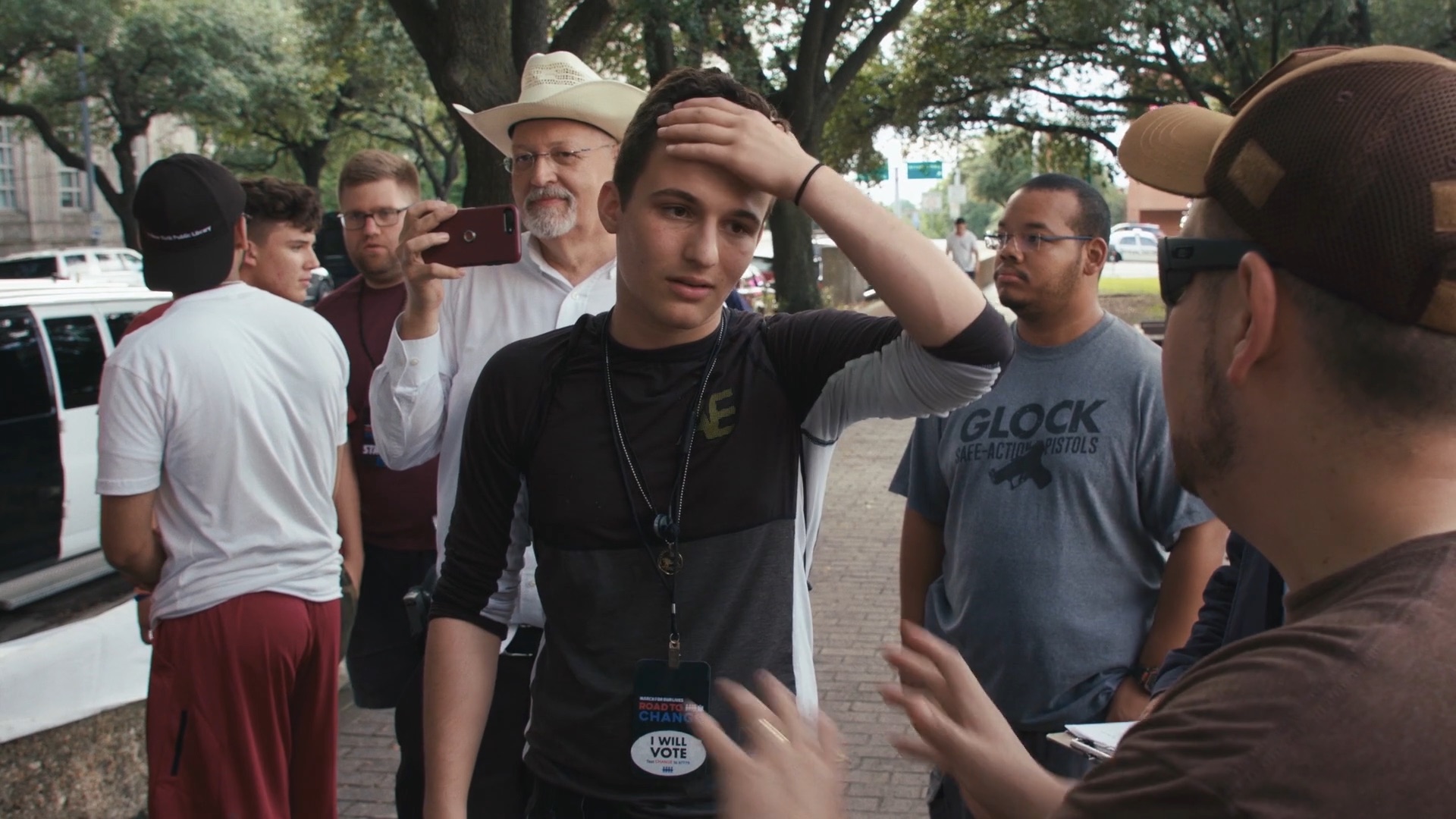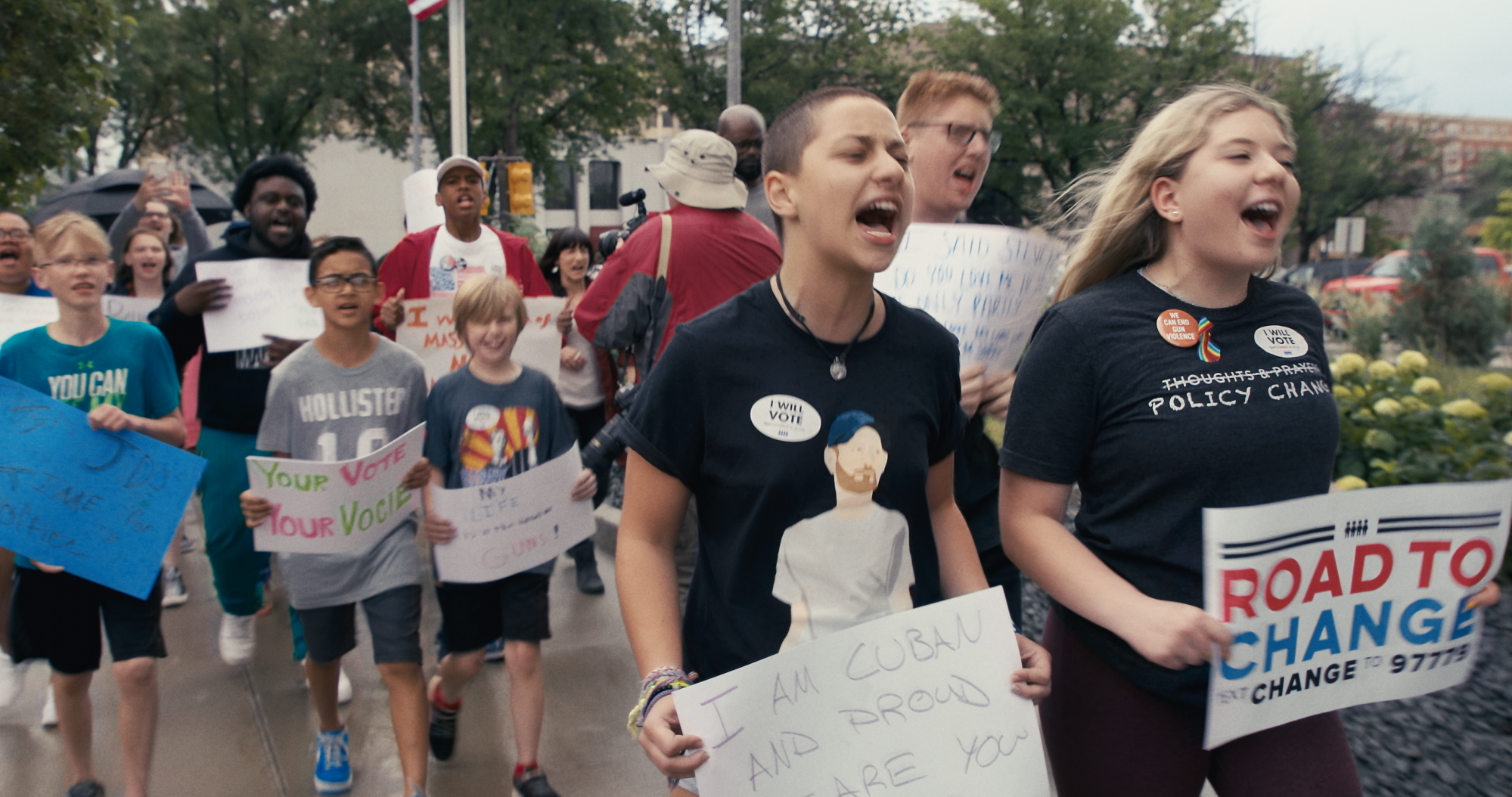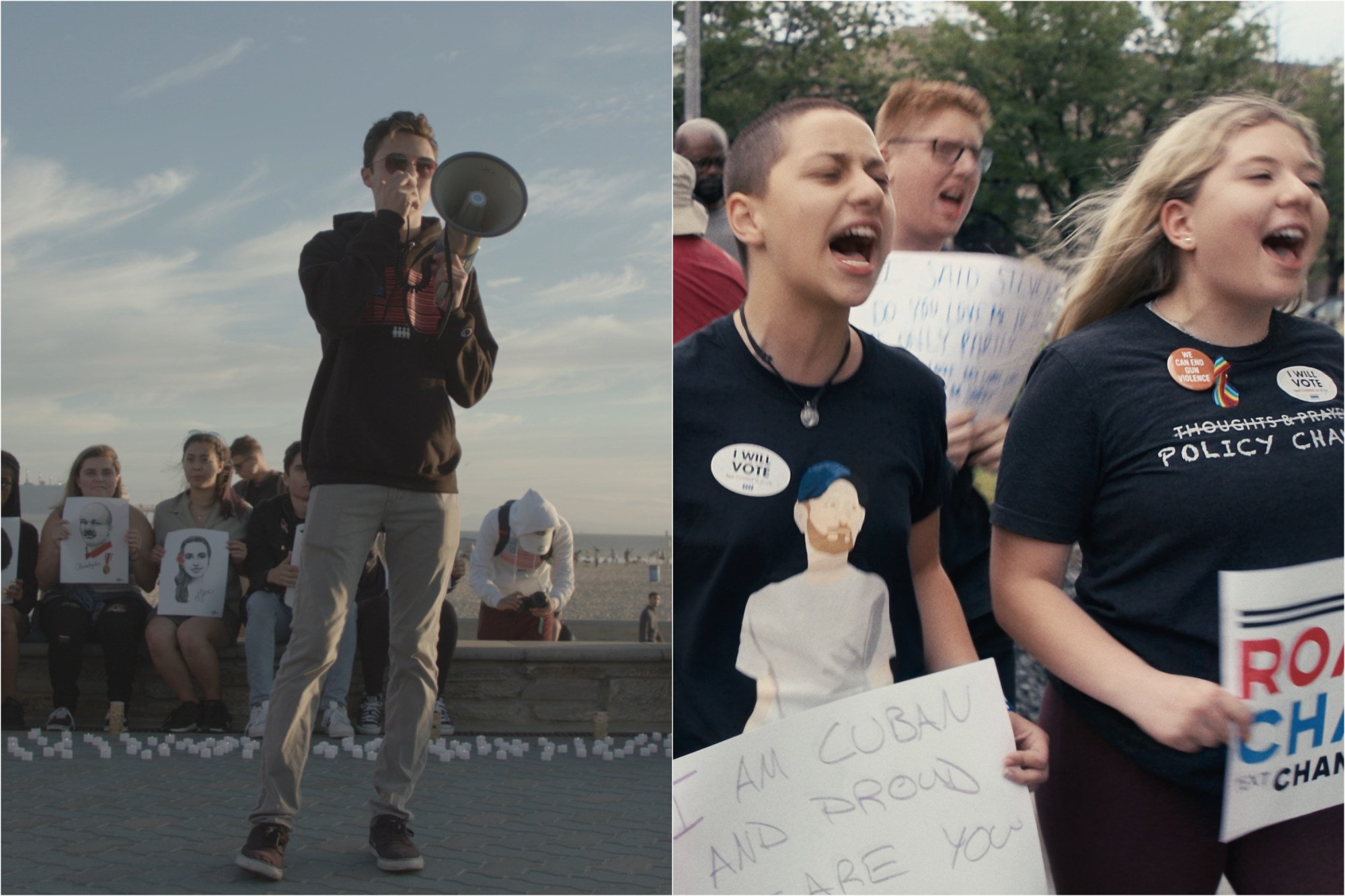It’s been 986 days since the Marjory Stoneman Douglas High School shooting on February 14, 2018, which took 17 lives and injured 17 people. Since that day, Stoneman Douglas students David Hogg, Emma Gonzales and a handful of other supporters have not stopped advocating for legislation to prevent gun violence in America, where, on average, 100 people die from gun violence each day. Their faces have appeared on the covers of countless magazines and while the students have faced intense criticism from right-wing media (and its supporters), their likenesses have become representative of Gen Z and the sheer power of today’s youth.
Ever since they organized the first March For Our Lives protest on March 24, 2018 — one of the largest youth-led movements in recent history — the student activists have worked tirelessly to remove governmental officials who support the NRA from office, transforming their grief and anger into action and community building. They’ve made it a point to show up for Black and brown communities, who are at least 10x more likely to suffer from gun violence. Collaboration has been key to making all of their efforts happen. “It’s been a really hard journey, but we’ve had a lot of progress that we’ve made in part because of those that have come before us and mentors, like Erica Ford, who have helped us along the way,” David tells i-D.
A new documentary, called Us Kids, captures the trajectory of the students efforts and follows the Parkland survivors 18 months after the shooting. Directed by Kim A. Snyder, the film is an honest portrayal of the teenagers’ lives, striking a balance between the horrifying experience of surviving a school shooting to feeling hopeful and optimistic by how many activists have come together to incite change. Kim, who directed NEWTOWN, a documentary about the Sandy Hook shooting (that took the lives of 26 first graders and their teachers), believes we can learn a lot from the Parkland kids.

“Their engagement with youth and adults in disparate parts of the country, with varying views, in such a respectful and patient way made me feel hopeful that civic dialogue as we once knew it might be possible in these polarizing times,” Kim says. This is something she hopes viewers of the documentary will recognize as well, especially ahead of one of the most important elections in history.
“One of the reasons why we’re really excited about the documentary,” David says, “is because it’s something that people can watch, especially young people, and see the impact of what happens when you vote.” Ahead of its release, i-D spoke with David about Us Kids and what he’s learned about activism.
It was really hard to put together questions to ask you. What has it been like building this movement?
It’s been a journey for sure. I think the important thing to recognize though, is that it wasn’t me that built the movement. I wouldn’t even argue that it was necessarily, you know, March For Our Lives that built the movement. I would argue it was these groups that have been working for decades, you know, parents that decades ago lost their children to gun violence. Siblings that lost their brothers and sisters to gun violence. I would say more than anything, it started with people like Erica Ford in New York City, and others decades ago who have never been recognized. If I was to give credit to anyone, it would be the predominantly Black and brown [people], and the LGBTQ+ community, who have never gotten the attention that they deserve or acknowledgement for the work that they’ve done for decades to get gun violence down as much as possible in their communities.
How have you built on what they were already creating? How did you expand on that or collaborate with them?
It was really through a lens of collaboration. We went across the country and met with community organizers and we tried to do whatever we could to help raise money for them through merchandise sales, and [organizing] at the town halls and building coalitions, asking people how March For Our Lives could be helpful in their community. At the time when March started, we obviously didn’t understand what goes on in any other community than Parkland.
More people got involved with the organization, it’s really been about collaboration and helping to build a rising tide for the movement, not necessarily being solely concerned with who gets credit for what, but trying to praise each other publicly and doing the work to lift each other’s voices up. Some of the parents in Parkland, like Manuel Oliver, for example, or Fred Gutenberg, and others have been working every day since their child was stolen from them by gun violence
I was wondering what it was like engaging with the protestors at the different March For Our Lives events?
It was a little intimidating considering they were shouting our names. I mean, it’s complicated because sometimes obviously, we didn’t necessarily know who they were. We didn’t know if they were conservatives or if they were extremists. It was interesting to see how some people were willing to agree to disagree, or even support some of the things that March supports. Even though it’s not everything, but to see that there can be progress that is made was something foreign to me. I thought it was certainly interesting, that’s for sure. But for some people who engage with those on the far right and explain why we support what we support, it can make it a lot harder for them to believe that you’re some kind of [leftist] pawn or something, and that that we’re really just doing this because we don’t want what happened at our school to happen to any community or any school.
How have you dealt with the criticism you’ve received?
I’ve had to learn how to have a thick skin. I had to realize that, especially because of the societal friction that activism and organizing creates, you can’t rely on social media as a validator to help deal with your insecurities. It’s best dealt with a really good group of friends that you have around you, that you can talk to get that validation, to know that you’re going in the right direction. And if you do mess up, they’ll call you in to talk about it. Also just not paying attention to it, trying not to think about it and taking breaks has been really helpful.
It seemed like Road to Change, the March For Our Lives summer bus tour in 2018, was a really unique experience and I was just wondering, would you say it was isolating or empowering? What were some of the emotions you felt while you were orchestrating the March and being on the road?
I think in many ways it was really inspiring to see how many young people there are across the country doing this work, trying to get young people out to vote and do activism in their communities. But it was also, in a way, almost traumatizing hearing all these terrible stories of people that had lost people to gun violence, the terrorization of our undocumented community, the criminalization of Black and brown youth and the failures of our carceral system. Realizing, on the tour, how gun violence is an issue that of course has to do with gun laws, but also has to do with systemic injustice and racism in our society, and realizing how it plays into that. And the reason why communities like Parkland don’t have shootings on a daily basis isn’t because we have the most cops, it’s because we have the most resources. Obviously, we lived in a bit of an isolated bubble in Parkland. It was definitely eye-opening seeing how different so many communities across the United States are treated differently by our own government.

What does it feel like to have the film released and shared with the world? What do you hope people will take away from seeing it?
I hope people take away two things from seeing it. I want people to be cautiously hopeful and somewhat optimistic, hopefully to believe things can get better. I want people to realize too, that we really are just kids, you know, I was 18 when we were on tour. It shouldn’t have to be young people going on a bus tour across the country, saying that people shouldn’t be bringing guns into their schools and communities on a daily basis, for there to be political action. It should be our elected officials and the adults that make it happen. But sadly, not all adults for sure, but many of them, especially in elected office have completely failed our generation. It’s really sad and horrifying that we live in a society where children demanding not to die in their schools and communities on a daily basis is a political subject, let alone a controversial one.
So, what would you recommend to people who want to get involved?
There’s no organization that helps a community better than one from your own community. But if you’re interested, you can join March For Our Lives. We have digital hubs, general protests and town halls across the country. Young people can take part in any one of our 300 chapters or they can start their own in their community. And of course, first and foremost, make sure that you vote and everyone you know votes because our generation has seen the costs of what happens when we have elected officials that would rather protect an AR-15 than a teenager’s life. The only way that we’re ever going to get that to change is by voting out corrupt elected officials that have not prioritized the safety of the people, but instead are interested in the profits of the gun lobby.
Is there anything else you want to say about the film, what you guys are working on and what you’ve been able to achieve?
We really need young people to continue to step in and step up because we have a lot of work ahead. This is just the beginning. The easy part is the election. The hard part is holding people accountable for the next two, four, six years and making sure that we’re able to get the laws passed that we need to have a survivable future for our generation. And to do that, we need every young person to become politically involved.
On October 30, Us Kids will be released nationwide via Alamo Drafthouse Virtual Cinema. For more information, visit www.uskidsfilm.com.


